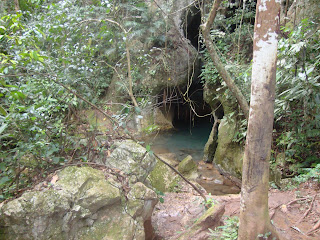Every Monday, Wednesday and Friday morning, Isla Bonita Primary School would have assembly and as a part of their morning assembly they would sing the Belize National Anthem. Listening to them sing would remind me of our own anthem and I was interested in hearing the differences.
On our last day at Isla Bonita, we student interns decided to sing the Star Spangle Banner for our assembly and it was wonderful getting to share our anthem with our kids in the same way they shared their with us.
Here is the words to the Belize National Anthem as well as a video with the song.
The National Anthem of Belize

"Land of the Free"
O, Land of the free by the Carib Sea,
Our manhood we pledge to thy liberty
No tyrants here linger, despot must flee
This tranquil haven of democracy
The blood of our sires which hollows the sod,
Brought freedom from slavery oppression's rod
By the might of truth and the grace of God.
No longer shall we be hewers of wood.
Chorus:
Arise! Ye sons of the Baymen's clan,
Put on your armours, clear the land!
Drive back the tyrants let despots flee-
Land of the free by the Carib Sea!
Nature has blessed thee with wealth untold,
O'er mountains and valleys where prairies roll;
Our fathers, the Baymen, valiant and bold
Drove back the invaders; this heritage hold
From proud Rio Hondo to old Sarstoon,
Through coral isle,over blue lagoon;
Keep watch with the angels, the stars and moon;
For freedom comes to-morrow's noon.
Chorus:Arise! Ye sons of the Baymen's clan,
Put on your armours, clear the land!
Drive back the tyrants let despots flee-
Land of the free by the Carib Sea!
And of course the National Anthem of the United States of America!

"The Star Spangled Banner"
Oh, say, can you see, by the dawn's early light,
What so proudly we hail'd at the twilight's last gleaming?
Whose broad stripes and bright stars, thro' the perilous fight,
O'er the ramparts we watch'd, were so gallantly streaming?
And the rockets' red glare, the bombs bursting in air,
Gave proof thro' the night that our flag was still there.
O say, does that star-spangled banner yet wave
O'er the land of the free and the home of the brave?
On the shore dimly seen thro' the mists of the deep,
Where the foe's haughty host in dread silence reposes,
What is that which the breeze, o'er the towering steep,
As it fitfully blows, half conceals, half discloses?
Now it catches the gleam of the morning's first beam,
In full glory reflected, now shines on the stream:
'Tis the star-spangled banner: O, long may it wave
O'er the land of the free and the home of the brave!
And where is that band who so vauntingly swore
That the havoc of war and the battle's confusion
A home and a country should leave us no more?
Their blood has wash'd out their foul footsteps' pollution.
No refuge could save the hireling and slave
From the terror of flight or the gloom of the grave:
And the star-spangled banner in triumph doth wave
O'er the land of the free and the home of the brave.
O, thus be it ever when freemen shall stand,
Between their lov'd homes and the war's desolation;
Blest with vict'ry and peace, may the heav'n-rescued land
Praise the Pow'r that hath made and preserv'd us a nation!
Then conquer we must, when our cause is just,
And this be our motto: "In God is our trust"
And the star-spangled banner in triumph shall wave
O'er the land of the free and the home of the brave!




 I hope that this experience will act as the stepping stone I hope it was in preparing me to enter into the Peace Corps. I know this was only a small taste to what living in a 3rd world country is like, but it was a great glimpse into life in other countries.
I hope that this experience will act as the stepping stone I hope it was in preparing me to enter into the Peace Corps. I know this was only a small taste to what living in a 3rd world country is like, but it was a great glimpse into life in other countries. 


















 As part of my teaching internship here in Belize, I have been assigned to Isla Bonita Elementary School. The grades here are different then that of the States. Here the grade levels go from Infant 1, Infant 2, Standard 1, Standard 2, Standard 3, Standard 4, Standard 5 and Standard 6. Since my placement back in North Carolina 2nd grade, I was placed with the Standard 1 class. While it is compared to being more like 3rd grade, to me the ages as well as many aspects of the curriculum seems to reflect 2nd grade more.
As part of my teaching internship here in Belize, I have been assigned to Isla Bonita Elementary School. The grades here are different then that of the States. Here the grade levels go from Infant 1, Infant 2, Standard 1, Standard 2, Standard 3, Standard 4, Standard 5 and Standard 6. Since my placement back in North Carolina 2nd grade, I was placed with the Standard 1 class. While it is compared to being more like 3rd grade, to me the ages as well as many aspects of the curriculum seems to reflect 2nd grade more.






.JPG)

.JPG) Because many of the locals can not afford to pay for school at the other Elementary Schools, the Roman Catholic School is heavily populated. Classroom sizes are close to 30, yet the rooms are very small.
Because many of the locals can not afford to pay for school at the other Elementary Schools, the Roman Catholic School is heavily populated. Classroom sizes are close to 30, yet the rooms are very small..JPG)
.JPG)
.JPG)
.JPG)


